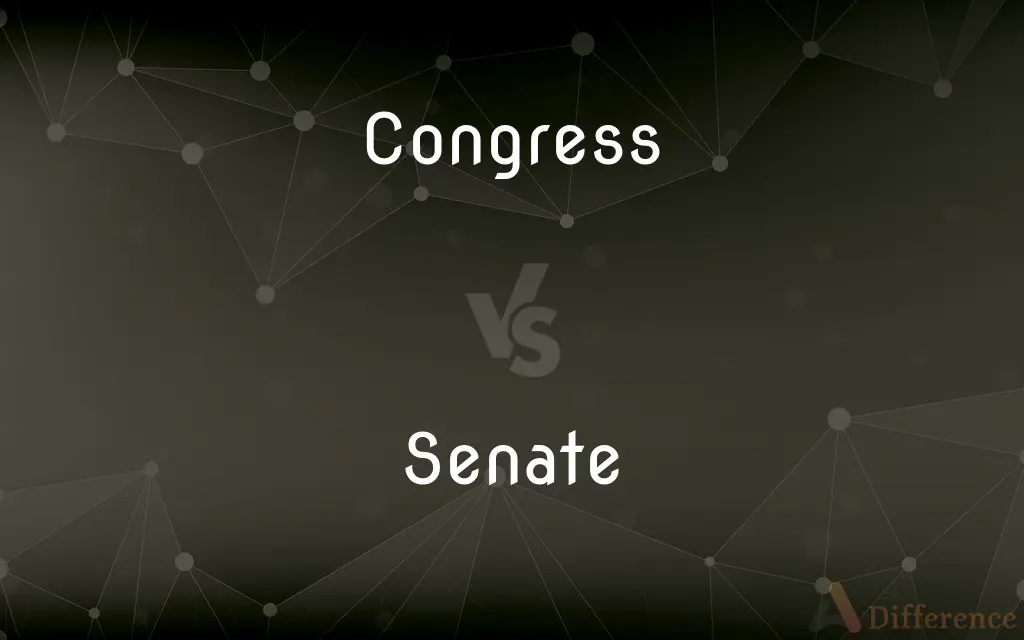Congress vs. Senate — What's the Difference?
By Tayyaba Rehman & Maham Liaqat — Updated on March 24, 2024
Congress is the bicameral legislature of the United States, comprising the House of Representatives and the Senate, while the Senate is one of its two chambers, focusing on equal representation from each state.

Difference Between Congress and Senate
Table of Contents
ADVERTISEMENT
Key Differences
Congress and the Senate are integral components of the United States legislative branch, but they serve different functions and represent the American people in unique ways. Congress is the overarching legislative body responsible for making federal laws, composed of two chambers: the House of Representatives and the Senate. The House of Representatives is based on the population of each state, making it more directly reflective of the nation's demographic distribution. On the other hand, the Senate is structured around equal representation, with each state, regardless of size or population, electing two senators. This system ensures that both populous and less populous states have an equal voice in some legislative matters.
The House of Representatives is designed to be more responsive to the public, with members elected every two years. This short term encourages representatives to stay closely connected with their constituents' needs and preferences. Conversely, senators serve six-year terms, allowing them more stability and the ability to focus on longer-term issues without the immediate pressure of reelection. The longer term is thought to provide senators with the opportunity to deliberate more deeply on complex issues.
Another distinction is the unique powers and responsibilities assigned to each chamber. The House of Representatives has the exclusive right to initiate revenue bills and impeach federal officials. Meanwhile, the Senate holds the power to confirm presidential appointments to the judiciary and executive departments, ratify treaties, and conduct impeachment trials. These responsibilities underscore the Senate's role in providing a check on the executive branch and ensuring that long-term interests are considered in the governance of the country.
The two chambers operate differently as well. The House has more structured rules and limits on debate, reflecting its larger size and the need for efficiency. The Senate, with its smaller membership, allows for more open debate and fewer restrictions on how members can address issues. This flexibility can make the Senate a venue for extensive discussion and compromise.
Despite these differences, both the House of Representatives and the Senate must work together to pass legislation. A bill must be approved by both chambers in the same form before it can be sent to the President for signature into law, highlighting the importance of cooperation and compromise in the legislative process.
ADVERTISEMENT
Comparison Chart
Composition
Bicameral: House of Representatives and Senate
One of two chambers of Congress
Representation
House: based on state population, Senate: equal
Equal representation from each state (2 senators each)
Term Length
House: 2 years, Senate: 6 years
6 years
Powers
Initiates revenue bills, impeaches (House)
Confirms appointments, ratifies treaties, conducts impeachment trials
Operational Approach
House: structured debate, Senate: more open
More open debate and fewer restrictions
Compare with Definitions
Congress
The House of Representatives and the Senate.
Congress passed a new healthcare bill.
Senate
An assembly or council of citizens having the highest deliberative and legislative functions in a government.
The ancient Roman Senate was a powerful political institution.
Congress
A formal meeting or assembly of representatives for discussion and action on national issues.
The international congress on climate change convened in Paris.
Senate
The upper chamber of the United States Congress, with equal representation from each state.
The Senate voted to confirm the new Supreme Court justice.
Congress
A collective term for legislative bodies in other countries.
The Philippine Congress is bicameral, similar to the United States.
Senate
A body of university faculty and administrators governing academic affairs.
The university senate approved the new curriculum.
Congress
An association of sports teams that organizes competitions.
The Ivy League congress decided on the season's schedule.
Senate
In historical contexts, a council of elders or the ruling body of a city or state.
The Athenian senate was instrumental in decision-making.
Congress
Congresses are formal meetings of the representatives of different countries, constituent states, organizations, trade unions, political parties or other groups. The term originated in Late Middle English to denote an encounter (meeting of adversaries) during battle, from the Latin congressus.
Senate
A legislative or governing body in other countries or organizations.
The French Senate meets in the Luxembourg Palace.
Congress
A formal assembly of representatives, as of various nations, to discuss problems.
Senate
A senate is a deliberative assembly, often the upper house or chamber of a bicameral legislature. The name comes from the ancient Roman Senate (Latin: Senatus), so-called as an assembly of the senior (Latin: senex meaning "the elder" or "old man") and therefore considered wiser and more experienced members of the society or ruling class.
Congress
The national legislative body of a nation, especially a republic.
Senate
The smaller upper assembly in the US, US states, France, and other countries
The senate must ratify any treaty with a two-thirds majority
Congress
The national legislative body of the United States, consisting of the Senate and the House of Representatives.
Senate
The state council of the ancient Roman republic and empire, which shared legislative power with the popular assemblies, administration with the magistrates, and judicial power with the knights.
Congress
The two-year session of this legislature between elections of the House of Representatives.
Senate
Senate The upper house of the US Congress, to which two members are elected from each state by popular vote for a six-year term.
Congress
The act of coming together or meeting.
Senate
Often Senate The upper house in the bicameral legislature of many states in the United States.
Congress
A single meeting, as of a political party or other group.
Senate
Senate The upper legislative house in Canada, France, and some other countries.
Congress
(archaic) A coming together of two or more people; a meeting.
Senate
The supreme council of state of the ancient Roman Republic and later of the Roman Empire.
Congress
A formal gathering or assembly; a conference held to discuss or decide on a specific question.
Senate
The building or hall in which such a council or assembly meets.
Congress
A legislative body of a state, originally the bicameral legislature of the United States of America.
Senate
A governing, advisory, or disciplinary body of some colleges and universities composed of faculty members and sometimes student representatives.
Congress
An association, especially one consisting of other associations or representatives of interest groups.
The National Congress of American Indians
Senate
In some bicameral legislative systems, the upper house or chamber.
Congress
(intransitive) To assemble together.
Senate
A group of experienced, respected, wise individuals serving as decision makers or advisors in a political system or in institutional governance, as in a university, and traditionally of advanced age and male.
Congress
To meet in a congress.
Senate
An assembly or council having the highest deliberative and legislative functions.
The senate was thus the medium through which all affairs of the whole government had to pass.
Congress
A meeting of individuals, whether friendly or hostile; an encounter.
Here Pallas urges on, and Lausus there;Their congress in the field great Jove withstands.
Senate
The upper and less numerous branch of a legislature in various countries, as in France, in the United States, in most of the separate States of the United States, and in some Swiss cantons.
Congress
A sudden encounter; a collision; a shock; - said of things.
From these laws may be deduced the rules of the congresses and reflections of two bodies.
Senate
The governing body of the Universities of Cambridge and London.
Congress
A gathering or assembly; a conference.
Senate
In some American colleges, a council of elected students, presided over by the president of the college, to which are referred cases of discipline and matters of general concern affecting the students.
Congress
A formal assembly, as of princes, deputies, representatives, envoys, or commissioners; esp., a meeting of the representatives of several governments or societies to consider and determine matters of common interest.
The European powers strove to . . . accommodate their differences at the congress of Vienna.
Senate
Assembly possessing high legislative powers
Congress
The collective body of senators and representatives of the people of a nation, esp. of a republic, constituting the chief legislative body of the nation.
Senate
The upper house of the United States Congress
Congress
The lower house of the Spanish Cortes, the members of which are elected for three years.
Congress
The legislature of the United States government
Congress
A meeting of elected or appointed representatives
Congress
A national legislative assembly
Common Curiosities
What is Congress?
Congress is the bicameral legislature of the United States, consisting of the House of Representatives and the Senate, tasked with making federal laws.
Can legislation pass without both the House and Senate's approval?
No, legislation must be approved by both chambers of Congress to become law.
What is the Senate?
The Senate is one of the two chambers of the United States Congress, known for its equal representation of states and longer terms for senators.
How are members of Congress elected?
Members of the House of Representatives are elected based on state populations, whereas senators are elected with two per state.
Why does the Senate have longer terms than the House?
Senate terms are longer to provide stability and allow for a focus on long-term issues without the immediate pressure of re-election.
What role does the House of Representatives play in the impeachment process?
The House has the exclusive power to impeach federal officials, which is then followed by a trial in the Senate.
What is a bicameral legislature?
A bicameral legislature is a two-chambered legislative body, such as the United States Congress, composed of the House of Representatives and the Senate.
What unique powers does the Senate have?
The Senate confirms presidential appointments, ratifies treaties, and conducts impeachment trials.
How does the Senate's equal representation affect legislation?
Equal representation ensures that all states have an equal voice in the Senate, promoting a balance between populous and less populous states.
How do the operational approaches of the House and Senate differ?
The House operates under more structured rules to manage its larger size, while the Senate allows for more open debate.
What ensures the Senate's role as a check on the executive branch?
The Senate's powers to confirm appointments, ratify treaties, and conduct impeachment trials serve as checks on the executive branch.
What is the role of the Senate in foreign policy?
The Senate plays a key role in foreign policy by ratifying treaties and confirming diplomatic appointments.
Can the House of Representatives ratify treaties?
No, treaty ratification is a power exclusively held by the Senate.
How does a bill become law in Congress?
A bill must be passed by both the House and Senate in identical form and then signed by the President to become law.
How are Senate members distributed across states?
Each state is represented by two senators, regardless of its population size.
Share Your Discovery

Previous Comparison
State vs. Government
Next Comparison
Advil vs. MotrinAuthor Spotlight
Written by
Tayyaba RehmanTayyaba Rehman is a distinguished writer, currently serving as a primary contributor to askdifference.com. As a researcher in semantics and etymology, Tayyaba's passion for the complexity of languages and their distinctions has found a perfect home on the platform. Tayyaba delves into the intricacies of language, distinguishing between commonly confused words and phrases, thereby providing clarity for readers worldwide.
Co-written by
Maham Liaqat















































